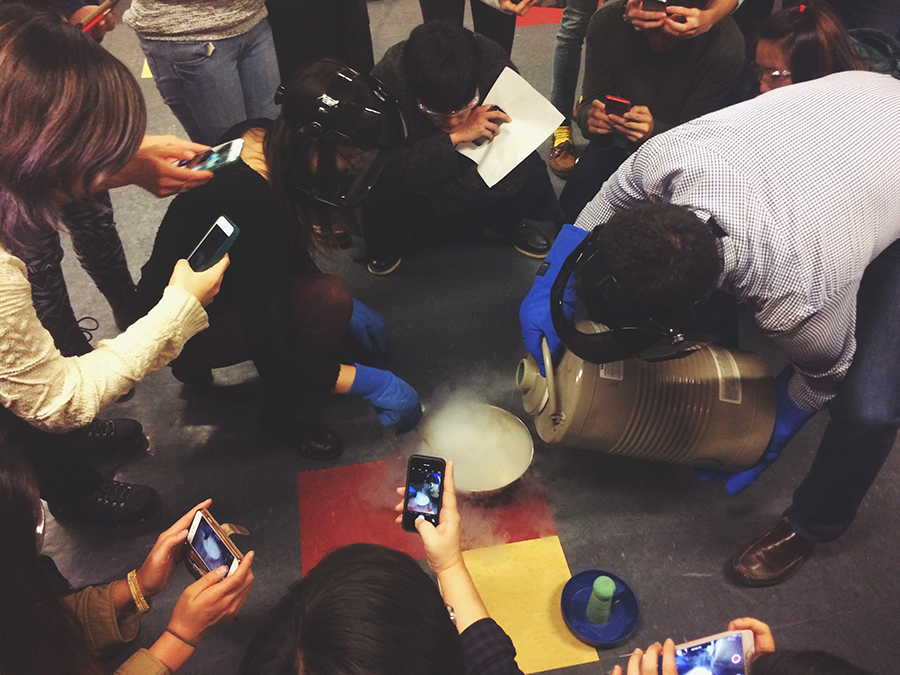
- By Irina Rasskazova -
The first time I've heard about the Independence Activity Period* (or simply IAP) at MIT, I thought that there will be nothing for me. After all, it's one of the best institutes for natural sciences – so what a person of a humanities bent like me can do there? Guess what – I was totally wrong.
In reality, there are courses for everybody's taste. Social sciences, economics, arts, media, mathematics, philosophy, sports, music – name it and most probably it's gonna be among IAP offerings. I know it can be difficult sometimes to make a decision when you're faced with so many options (and MIT still hasn't came up with a time turner) – that's why I compiled a list of the top-5 things that you can and should learn during IAP, no matter what your background is.
1. Science (sorry, but after all it's MIT) of cooking
The first class on my schedule was probably my most scientific choice, and yet it was about cooking! Who would have thought (certainly not me) that cooking can be considered as an application of science and engineering, and that to become a great chef you need some knowledge of Physics, Chemistry, and even Materials Science.



Thanks to “Learning Science Through Cooking” I got to know how crystal structure of chocolate impacts its taste and how to make an ice-cream using liquid nitrogen. I experimented with molecular cuisine: with a simple set of tools, such as cacao, calcium and water, I created chocolate caviar. Our group also took a field trip to Tazza Chocolate Factory in Somerville which is famous for its stone ground chocolate. Ah, it's incredible how much chocolate I've eaten... and all for the sake of science!
2. Understand what you want to do with your life
The IAP course that was truly eye-opening was called “Career Negotiation”. It was sponsored by the MIT Spouses & Partners Group, and consisted of an introductory lecture and three workshops led by experienced mediators and personal coaches. The best thing about this class is that it is helpful for anyone, no matter what carrier path or stage you are in. Maybe, you have tough time deciding what do you want to do (whether it is a dilemma between academia and industry or a midlife crisis). Perhaps, you don't know how to secure your dream job. Or you might already have the job you like and are wondering how to build continuous fulfillment. Using negotiation theory concepts, you'll be able to navigate through each stage of constructing your career like a boss.

3. Master your message
Talking might seem a simple thing, cause we all do it everyday, thus sometimes we underestimate how crucial it is to understand the communication process fully. Conversations are easier when you not only listen but also hear what others say. Presentations are much more effective when you understand your goals and your audience's interest. So, the rule of thumb is never miss an opportunity to improve communications and leadership skills!
“Cultivating Your Leadership Presence” was focused on how to succeed and show your best in any public speaking situation, whether it is a presentation, interview or a business meeting. This class was quite intimate – only 10 people – and highly interactive: we were telling stories, presenting, singing, improvising, giving feedback, and even jumping on fitness balls (which was a lot of fun)! Everyone also had a chance to have a private consultation with our coach and received a recording of their performances.

“Leader, Maverick or Impostor”, sponsored by Sloan School of Management, was created to help participants unleash their highest future potential by recognizing and working towards eliminating self-limiting behaviors. While we all often struggle with procrastination, risk aversion and overwork, implementing a growth mindset and practicing self-compassion can help us overcome those issues and lead to greater achievements.
MIT Museum hosted a series of communications workshops – “MIT Can Talk” during the last week of IAP. My favourite one of the series was about audience engagement. It was presented by director and actress of the Central Square Theater Debra Wise. She was teaching us to feel comfortable in front of the audience, to control body movements, and to quickly adapt when something doesn't go as planned. I was so inspired that for a moment even thought about joining a theatre group :)
4. How to draw like a PRO in 2 hours
It's a wonderful feeling to see how just with the touch of a painter's hands blank paper transforms into a meaningful picture with a character. However, it's even better if you can be a painter and do the magic yourself! I've always liked to draw, especially fashion-like illustrations, but there are things that are just undrawable, or so I thought – before attending Mauricio Cordero's IAP class, also sponsored by MIT S&P. In his workshops on 'eyes' and 'hands' he taught us to observe these objects differently and to translate our vision to paper using just couple of simple tools: pencil, graphite powder, and eraser.

5. Experience another culture
If I'm asked what my favourite thing is, I'll say with a 99% certainty that it is travelling. Learning about new cultures, trying exotic cuisine, meeting locals – these are unforgettable experiences. Though sometimes you can get a glimpse of a foreign culture without a hurdle of packing a suitcase. So this January thanks to IAP I could immerse into Japanese tradition. I practiced Kyudo – Japanese archery, that is a martial art and simultaneously a meditation. I was fascinated by the idea behind it – the philosophy of letting go. When you let go of Ya (“arrow”), you're letting go of any thoughts that bother you; and it doesn't matter if Ya met the target because the most important thing is to find your place of mindfulness. Besides Kyudo, I also attended Japanese tea ceremony that was held by beautiful Japanese women in kimonos, and created my very own ikebana – Japanese flower arrangement.



* The Independence Activities Period (IAP) was launched in 1971 to provide members of MIT community, including students, faculty, staff, alumni, and family members, with a unique opportunity to organize and participate in a wide variety of self-development activities throughout the month of January.



